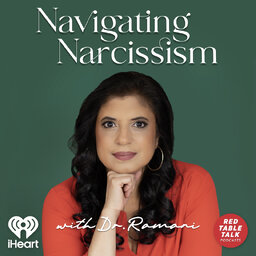Moving Through Generational Trauma Part 1
Our Guest’s Father was considered the more affectionate parent, however, he was both physically and emotionally abusive towards our Guest, their brother and their mother. Listen to Part 1 of this two part episode to hear about the childhood trauma our Guest endured, and the steps they are taking to move through the abuse; and work through its generational impact.
Host Information:
Instagram: Dr Ramani's IG - @doctorramani
Facebook: Dr Ramani's FB - @doctorramani
Twitter: Dr Ramani's TW - @DoctorRamani
YouTube: Dr. Ramani’s YT - DoctorRamani
#NavigatingNarcissism
I want to hear from you, too.
Have a toxic topic you want me to explore? Email me at askdrramani@redtabletalk.com
I just might answer you questions on air.
This podcast should not be used as a substitute for medical or mental health advice. Individuals are advised to seek independent medical advice, counseling, and/or therapy from a health care professional with respect to any medical condition, mental health issue, or health inquiry, including matters discussed on this podcast.
Navigating Narcissism is produced by Red Table Talk Podcasts. EXECUTIVE PRODUCERS: Jada Pinkett-Smith, Fallon Jethroe, Ellen Rakieten, and Dr. Ramani Durvasula. Also, PRODUCER: Matthew Jones, ASSOCIATE PRODUCER: Mara De La Rosa. EDITORS AND AUDIO MIXERS: Devin Donaghy and Calvin Bailiff.
 Navigating Narcissism with Dr. Ramani
Navigating Narcissism with Dr. Ramani


